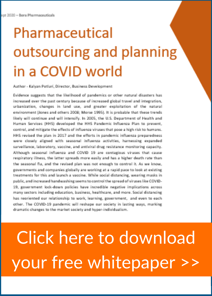Evidence suggests that the likelihood of pandemics or other natural disasters has increased over the past century because of increased global travel and integration, urbanization, changes in land use, and greater exploitation of the natural environment (Jones and others 2008; Morse 1995). It is probable that these trends likely will continue and will intensify.
“Companies are restructuring and reorganizing their manufacturing and supply chain activities to continue to provide products and services as efficiently as possible.”
While one cannot predict exactly when or where the next epidemic, pandemic or natural disaster will begin or occur, the threat of more issues such as these are real.

However, many nations are taking this opportunity and are advocating bringing manufacturing back to their respective nations.
Bringing back the supply of chemicals and APIs to individual nations will be extremely difficult.
This is where firms need to innovate, change, and have in place quality risk management strategies to develop and implement action plans and knowledge transfer programs to ensure the production of safe and effective medicines in times of staff shortages.
The risk assessment should look at current inputs and production to determine if increasing safety stock and building reactive capacity, automation, cross-training individuals to perform multiple activities when needed, determining what is critical to control in the manufacturing process and the impact of the reduction of routine activities designed under normal operating conditions and yet ensure an adequate level of control on the process and quality of the products it manufacturers.
While the pandemic is unlikely to abruptly shift pharmaceutical chemical supply lines, at least going forward when companies decide to outsource manufacturing, they should start focusing on having good reactive capacity close to where it is needed. Pharmaceutical companies and CDMO’s need to have footprints on multiple continents i.e., primary and secondary suppliers.
As a backup, companies should focus on manufacturing locations known to have financial stability, full supply chain capabilities, have established Contingency Plans, and eliminate those manufacturers least able to survive shutdowns and disasters.
It is imperative to have a well thought out Contingency Plan in place that considers multiple scenarios.
A good plan should include the following: Scenarios, Triggers, Response, Who to Inform, Key Responsibilities, and a Timeline.
At Bora, we understand that your product supply is critical and planning for the supply of your products in many types of disasters is a key responsibility of your CDMO partner. Want to learn how we at Bora think about the current COVID-19 situation and how we plan for contingencies, then download our comprehensive whitepaper “Pharmaceutical Outsourcing and Planning in a COVID World."
